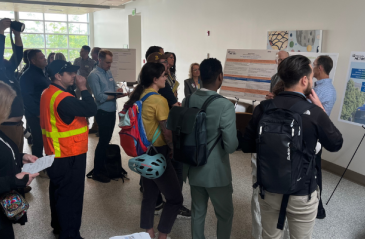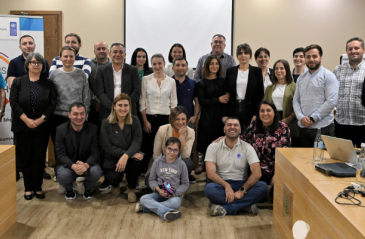
The information barriers holding back climate action and how to break them

How is New Orleans city government using data to pick up performance? @ojwise explains...
Share articleUnder @MayorLandrieu data, metrics and results are all top priorities for New Orleans
Share articlePragmatism and hard work – not ideology – are key to effective city govermment, says @ojwise
Share articleWe put our vision for government into practice through learning partner projects that align with our values and help reimagine government so that it works for everyone.
What do you think of when you hear “New Orleans”?
Maybe it's Mardi Gras or the buildings and unique atmosphere of the French Quarter? Or is it the jazz and eclectic mix of cultures, languages and cuisine? Perhaps it's less positive: even in the aftermath of Hurricane Harvey, we all remember the vivid horrors of Katrina.
But while few cities can offer up such a rich tapestry of vivid imagery, New Orleans has also become known in recent years for its high-performing city government, one that has helped underpin a renaissance encompassing new jobs and businesses, economic growth and reform. No wonder its outgoing (and term-limited) mayor, Mitch Landrieu, has been praised for his work.
One of Landrieu's earliest decisions as mayor was to set up an Office of Performance and Accountability (OPA) and task it with renewing and enhancing the performance of City Hall. As OPA director Oliver Wise points out, they had much to do.
“Back in 2011 we were just in our infancy,” he recalls. “This was just five years after Katrina, and the wounds were still very fresh. We had a depleted organisation - about half the city's workforce had been laid off since the hurricane. The civil servants who were still there had been through hell and back and were working under very trying circumstances. At the time, we had some consultants come in to give us the lay of the land. They had worked all around the world and they said it was the most dysfunctional government they had ever seen. Certainly, the idea of using data for accountability and transparency was completely foreign.”
Fast forward six years and it's fair to say it is foreign no longer.
Wise and his team wasted little time in getting down to work, helped in part by their knowledge that the boss had their back. “There was really nothing in the city like it before,” he says. “But the mayor was clear that a new day was dawning in City Hall and he wanted a team to use data to improve the mousetrap of government - in other words, to make government work better for the people. Our mission, then, is to use data to set goals, track performance, and get results.”
OPA's priority was to develop a strategic framework to map the city's overall direction. The framework - updated annually - is used to guide funding decisions and map programmes and services to the city's overall goals. “The city has quantifiable measures that we use to assess the achievement of those objectives,” explains Wise. “The services of each department are aligned to this framework.”
He goes on to say that he and his team track performance in two ways. Firstly, by collecting data and reporting out on metrics that are identified each budget year via Results NOLA, their online dashboard. And secondly, through “stat sessions”, open meetings where they review data and change course if necessary. “It's a feedback loop to see what's working and what's not, and what we need to improve,” he adds. “These are very much inspired by what Martin O'Malley did in Baltimore and Maryland.”
And the third prong of their approach is about getting results. Having reviewed the data to understand what works, OPA and city leaders go on to identify new ways to improve. “We act more the way an analyst in a financial firm does for a trader,” says Wise. “We provide departments with intelligence to help them make their job easier.”
But it's not just numbers and metrics. To illustrate his point, he cites the example of how the targeted use of data has directly saved lives. “We had a tragic fire in the city in November 2014,” he recalls.
“Three children and their mother and grandmother died in a house that had no smoke alarms. At the time, the onus was on citizens to call the fire service if they wanted assistance or a smoke alarm or fire safety advice. We found that this had inequitable outcomes - if you were poor, you were much less likely to have a smoke alarm.
“We worked with the Fire Service to be more proactive, and we were able to steer them towards those areas where the alarms were most needed. We did this by digging into all the data we could find, and this enabled us to identify those blocks of the city least likely to have alarms and most likely to suffer fatalities - i.e. homes which had lots of kids or older people. Seven months after this, there was a fire in an apartment building in one of the neighbourhoods we had identified and eleven people escaped - all because of a very cheap but strategically installed smoke alarm.”
Wise clearly loves his job and the city he serves. “The citizens in New Orleans are fiercely proud of their city,” he says. “They are committed to the city becoming a better place - our stat sessions programmes are public and we get a lot of public participation.”
He is also relishing the fact that his role is city-based, rather than one focused on national affairs. “Operational issues are what keep mayors and their staff up at night,” he points out. “Ideology doesn't do a whole lot in helping solve those problems. It takes pragmatism and a lot of hard work, as well as an honest look at the data to tell you what works and what doesn't.”
Asked if he would classify New Orleans as a “smart city”, Wise says that it is a work in progress. “There are a lot of dimensions to a ‘smart city'. One is that a city has the ability to learn quickly, and this means breaking away from a rules-based, compliance-driven mode of delivering services to one where you are iterating as you go. We are doing that a whole lot better than we were seven years ago. The real power is iteration - trying new things and seeing what works and making adjustments as and when needed.”
Mayor Landrieu brings down the curtain on his two terms in office in May 2018. Until then, Wise and his colleagues at OPA are focused on sprinting to the finishing line. But Wise also expresses confidence that the use of data to improve services will not be suddenly uprooted once the new mayor takes over.
“We now have a culture and expectation for ensuring there is accountability for service quality through the reporting of metrics,” he says. “But it's important not to set who we are right now in stone. The field of digital innovation is rapidly changing, and I think the next mayor needs to be able to adjust to those changing realities on the ground.”












